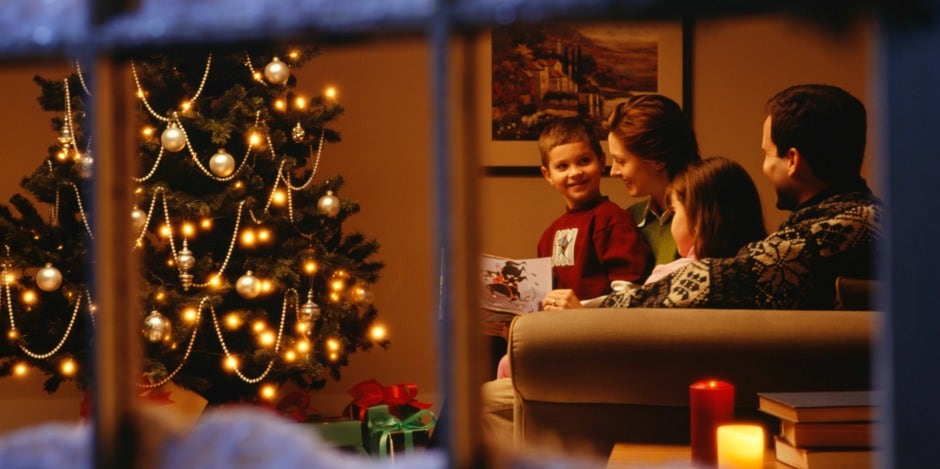The Real Origin Of Christmas (It's Not What You Think)
Christmastime was founded in the stars.

I don't know about you, but I'm bundled up good. Seriously, I look like a crazy bag lady or something. I'm wearing the works—hat, scarf, sweater, leggings, thick socks with long underwear. It's layers galore. I've got the heater blasting, and all my pets (my dog and two cats) are lying on heating pads in their little pet beds. (They LOVE these, by the way—just be sure to keep them set on "low" so you don't B.B.Q. Fluffy and Rover.)
Why? Because we're in the Northern Hemisphere, and the days are getting shorter, culminating tomorrow in the longest and coldest night of the year! (Yes, even in sunny Los Angeles...) That's right; tomorrow is the Winter Solstice. (If you're in the Southern Hemisphere, for you it's the Summer Solstice, the shortest night of the year! Whew, wish I was in Australia right about now.)
Now, if you don't know, the history of the Winter Solstice is steeped in astrology, and it's very much a part of Christmas and the holiday season. Before I tell you why, let me tell you what causes the Solstice. You'd think it's the coldest night of the year because it's when the Earth is the furthest from the Sun. Not true. Amazingly, we're a whopping 3 million miles closer to the Sun than during the summer. It's colder because the Earth's axis is tilted away from it, and on the Winter Solstice, our tilt gets as far from the Sun as it's going to get, before we start tilting the other way again. But before we start heading in the other direction, the Sun appears to STOP MOVING on the Winter solstice. In fact, the word "Solstice" comes from Latin, and means "the standing still of the sun." ("Sol" means sun, and "sistere" means to stand still.) And the Sun stays seemingly frozen in the sky for three days.
Now, imagine you're an ancient person, with no television, radios, electricity (no heating pads for your pets!), no satellites and no NASA website, and you look up at the sky and you notice that the Sun has stopped moving. The night is super long and very cold and you start thinking, "This is it. The gods have decided my people don't deserve to live anymore. They've killed the Sun, and life as we know it will cease."
So, every few minutes you franticaly check the sky, but no change. Day one: you're starting to panic. Day two: you're praying constantly. Day three; you're just sure all hope is lost. Somebody really screwed up for the gods to be this upset. And then, you behold a miracle.
On December 25th, the Sun seems to start moving again, as though reborn. You're so overjoyed, that you and everyone you know have wild feasts and make offerings of gifts to the divine and then each other, in the hope that all of your celebrations inspire favor with the gods so they never kill the Sun again.
Now, if you're thinking, "That's funny, feasting and gift-giving is what we do at this time of year," then you're right! Our holiday festivities in December, whether you celebrate Christmas, Hanukuh, Kwanzaa, Yule, or Saturnalia all have their origins tied to the Solstice. In fact, scholars all pretty much agree that the Christmas season is really an ancient Pagan tradition celebrating the rebirth of the SUN, not the "birth of the Son," and that Jesus was more likely born in the Spring.
When the Romans went around trying to spread Christianity, they said, "Sure, you can keep your Solstice festivals. Instead of celebrating the rebirth of the Sun, let's say it's Jesus's birthday and call it the birth of the Son." It's confusing because the whole "death for three days followed by a rebirth" idea is more of an Easter thing, so it would make more sense to celebrate Christmas at Easter time. But I'm not in charge of such things, clearly. Speaking of Easter, the Romans said to the Pagans, "Sure, you can keep your fertility festivals in the Spring with your eggs and bunny rabbits, but let's make it all about Jesus.")
Whatever holiday you celebrate at this magical, mystical time of year, I wish you all the good things the Solstice symbolizes—renewal, rejoicing, celebrations with loved ones, and a sense of peace and hope for the new year ahead.
May God and His planets and stars shower you and yours with love!
When it comes to your relationships that are personal and emotional, looking to a man's Sun sign in relation to yours won't explain how you'll relate. You can learn more about this, and so many other amazing truths at the intersection of astrology and love in a free newsletter you can sign up for here: Click here to receive Carol's newsletter for free.

